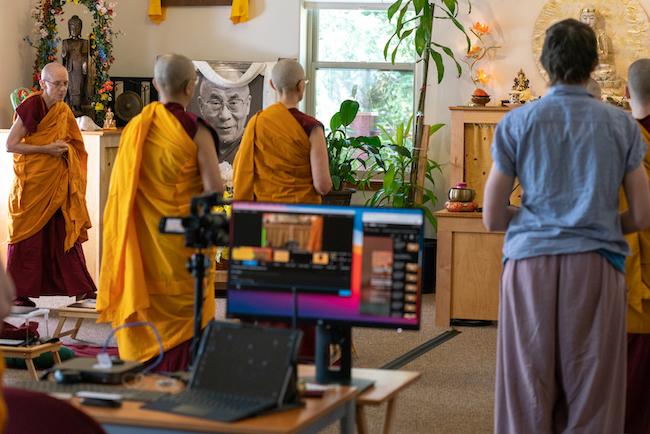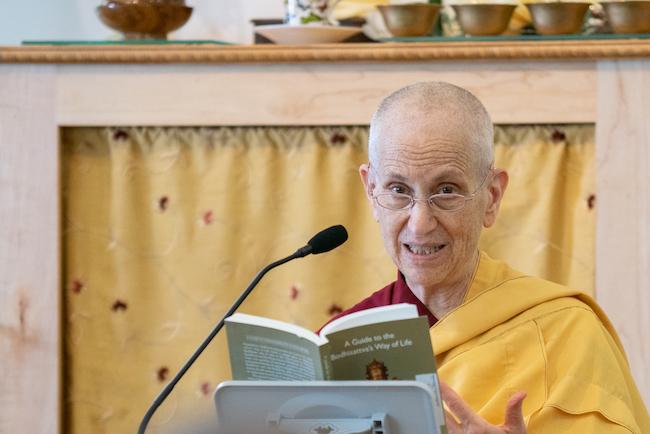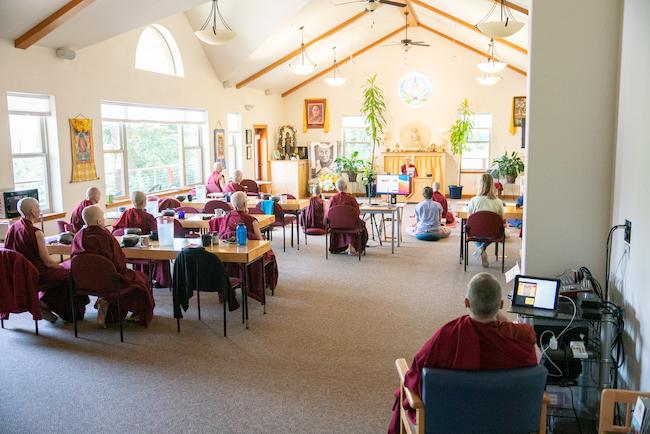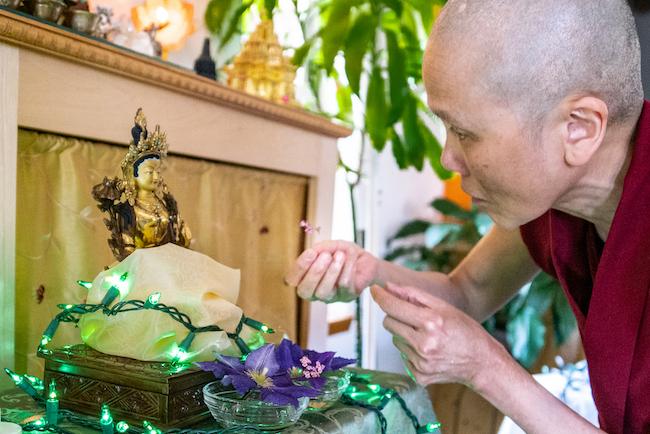Where We Gather: Sravasti Abbey
Where We Gather is a project to tell the stories of our many spiritual practices in the Pacific Northwest through words and pictures. Any group that would like to be part of the project can contact Rev. Gen Heywood at genheywood@att.net.
By Gen Heywood
On a hill in the woods of Newport, Washington the Dharma (the way taught by the Buddha, practices that lead to enlightenment) is shared and the Buddha’s teachings are applied to every aspect of modern life. Founded in 2003, Sravasti Abbey received the blessing of His Holiness the 14th Dalai Lama, who wrote in December of 2002, “It is particularly refreshing to know that the Abbey will be charting a new course as a place where both traditional Tibetan Buddhist teachings and innovative cultural forms will be present. Moreover, I am glad to know that the community seeks to provide both monks and nuns with not only equal opportunity, but also equal responsibility to study, practice and teach the Dharma.”
The name Sravasti Abbey was chosen by the Dalai Lama from a list offered by founder and abbess, Ven. Thubten Chodron. Sravasti, a place in the north India state of Uttar Pradesh, welcomed both female and male monastics to share the teachings during the time of the Buddha. That welcome continues at Sravasti Abbey.

The Abbey has long included virtual access to the teachings and sharing of the Buddhist practice. When the pandemic restrictions began, there was already a resourceful team of nuns with the skills needed to expand the virtual community. Chodron wrote in her 2020 annual report, ”Week by week we weighed the conditions, moving one retreat after another online. By summer, we knew the Abbey would stay closed to guests throughout 2020. However, we managed to stream every planned event and added more, allowing unprecedented international participation.” (Recordings of the teachings can be seen at https://www.youtube.com/user/sravastiabbey)

Each day at the Abbey there are teachings, meditations, service offerings, and regular ceremonies and celebrations of Buddhist life. Chodron reflects on how in the Buddhist practice each person needs to meet face to face with a teacher to learn how to follow and develop as a Buddhist. She speaks of the importance of being present with one another. There is much that we can get from time in the virtual space but there is something different about being with each other. Communities challenge us. We get inspired and frustrated, confronted with ourselves and lifted up beyond ourselves when we are in community. In the virtual space, we can tune out or distract ourselves. As we transition from the Covid restrictions, Chodron wonders if we have become comfortable with our own interruptions and with the distractions of being in our homes instead of in community.
She notes that, “In Buddhism, we need living teachers to help us on the spiritual journey. It is not enough to learn from a book or even from online videos. We need the insight and connection that comes from being with others who practice the Dharma.”

Each day, a member of the Sangha (the ordained community) shares a message about their experience of practicing the teachings. These are followed by questions that deepen the insight and understanding. The video recordings of this community of 16 nuns and one monk have received over 800,000 views in 2020 alone and reached people in Africa, most of Asia, all of the Americas, Australia, Europe, the Middle East, and Puerto Rico, and beyond.
The monastics practice the Dharma in their compassionate outreach to the broader community. They actively participate in prison ministry with in-person visits (pre-Covid) and correspondence nationwide. Locally, they support at-risk youth and interfaith activities in addition to offering day-to-day spiritual guidance.

It is evening in Newport when the community meets with Buddhist leaders in Taiwan through a virtual gathering space. The first greeting from Taiwan is a warm “Good Morning.” The 15 hour time difference means the visit is happening in Taiwan on the morning of the next day. The joyful visit is an example of the Buddhist practice of learning from others who have more experience. Sravasti Abbey is a young monastic community and benefits from the wisdom of those with long histories.
The Sangha depends on donations including the equipment they use. Haroldina, a 40-year-old Chevy truck, still has a mighty engine. Ven. Semkye notes how well the truck works saying, “This is my favorite form of transportation.”
Currently, Haroldina transports about 2,000 pounds of water-filled barrels from a well at the base of the property to the fruit trees on the hill. The drought, felt throughout Washington State, has put some of the pear, plum, and very old apple trees in danger. Not only are these trees important to the food supply for the Abbey, they are also cherished as part of the environment the monastics are stewarding.
Being humans means even monastics who study and meditate must do laundry, make meals, and complete cleaning tasks. This grounding in the everyday life makes a human connection that invites the guest and the monastic alike to be mindful of our shared life experience. Even the experience of the pandemic is an opportunity.
In the 2020 Annual Report Chodron wrote, “Together we can take these situations onto the path, use them to grow our love, compassion, wisdom, and skill, and resolve to transform our minds and fulfill our potential to become fully awakened to benefit others most effectively.”

Another hardship of witnessing the effects of global climate change is the reality of wildfires. On Friday, July 16, the monastics test all their planning with their first evacuation drill. A loud alarm sounds from their administration building. Residents and guests come from all directions to pick up their bags of belongings, wrangle the Abbey cats into their carries, load up the vehicles, including Haroldina, and drive to the assigned meeting space. Once there, the process is evaluated and improvements to the plan are included for the next drill.

After the wildfire drill, the monastics and guests return to their service offerings. In the administration building, several nuns work on needs that included the website, newsletters, facility upkeep, and retreat registrations. Samten returns to the plans for the Buddha Hall, a project delayed due to Covid-19. The Abbey has outgrown its current Meditation Hall and will greatly benefit from this 17,000 square-foot temple and library. There will be room for as many as 200 people in the temple which includes a main hall, a Tara Hall for meditation and a Vinaya Hall for Sangha rituals. On the main altar will be 10’ 6” statue of Shakyamuni Buddha seated on a lotus. On each side will be a 7’11” standing statue, on the Buddha’s right, Venerable Ananda, and on his left, the Buddha’s stepmother and the first Buddhist nun, Venerable Gotami.
“We are especially excited about creating a statue of Venerable Gotami as there are few sculptures of her in the world. We only know of four: at Wat Thepthidharam in Thailand, Dongyu Gyatsal Ling in India, Upaya Zen Center in New Mexico, Fo Guan Shan Buddha Museum in Kaoshiung, Taiwan.” (From Meet Venerable Gotami at https://sravastiabbey.org/meet-venerable-gotami/). The artists Peter and Denise Griffin will finish the statues at Sravasti Abbey and the community will be invited to help.

Since the beginning of the pandemic, the daily schedule remains much the same for the monastics. They start with meditation from 5:30 a.m to 7 a.m, followed by breakfast, service offerings, teaching, a noontime sharing of the Dharma by one of the monastics, lunch, more service offerings, a medicine meal or fasting, often followed by more teachings and meditating until after dark.
A sacrificial change brought by the pandemic is the moving of the practice of meditation and teaching to the dining hall during live-streamed programs. Reaching out to those who cannot visit means using the dining hall as it is the place where the computers and WiFi capability are best. Meditating next to a kitchen is a challenge even for the best in their practice.

Another important change made in this unusual year is the Sangha’s closing all in-person gatherings. Sravasti thrives on a partnership between monastics and members of the wider community. The volunteers and retreatants who would visit regularly in the pre-Covid years are essential to the life of the Abbey. They bring their life experiences, learn ways to practice from the monastics, and gain spiritual peace before returning to the chaotic world. Their donations of food and service are expressions of compassion and care of the monastics and the 373-acre property.
All within the Sangha are fully vaccinated. The Buddhist respect for study and science made the choice to be immunized easy and the requirement for all guests to be fully vaccinated an act of compassion.
On June 27, the first once-a-month Offering Service Saturday was held since the beginning of the pandemic. On July 17, fully vaccinated volunteers and monastics continued the work of clearing the forest roads and paths, cut up dead trees with chainsaws, and piled the wood by the road for heating during the winter.

The Offering Service Saturday in July was also a day of celebrating the Cittamani Tara Puja. All of the monastics took part in decorating the meditation space with flowers, lights, food offerings, musical instruments, water, and incense. All the volunteers and Abbey guests were welcomed to join in the ritual of song, meditation, and recitation. Here is a glimpse into the ritual:
They recite:
I and all sentient beings, the migrators as extensive as space, from now until we achieve the essence of awakening, go for refuge to the glorious sacred Gurus; we go for refuge to the perfect Buddhas, the Blessed Ones; we go for refuge to the sacred Dharma; we go for refuge to the exalted Sangha. (3x)
They sing:
Refuge and BodhicittaI take refuge until I have awakened in the Buddhas, the Dharma and the Sangha. By the merit I create by engaging in generosity and the other far-reaching practices, may I attain Buddha-hood in order to benefit all sentient beings. (3x)
And still early in the celebration, they recite:
The Four Immeasurables
May all sentient beings have happiness and its causes, May all sentient beings be free of suffering and its causes, May all sentient beings not be separated from sorrowless bliss, May all sentient beings abide in equanimity, free of bias, attachment and anger.
(Learn more here: https://thubtenchodron.org/meditation/08-sadhana/50-green-tara/)

On Sunday, July 18, Sravasti Abbey opened for the second Sharing the Dharma Day since restrictions started lifting. Any fully vaccinated person was welcome to register in advance and attend.
Ven Chonyi described the Abbey’s experience, “We set a limit of allowing 20 (fully vaccinated) people to come in person, but haven’t reached it yet. There were 17 for the first Sharing the Dharma Day — which would normally draw 25-40 or more — and only six or seven came in person for the one-week retreat over the Fourth of July week, which would also normally draw 25-30 or more.”
Both of these events, like all Abbey programs so far, were offered online.
Designed for those exploring Buddhism for the first time as well as those who have practiced all their lives, Sharing the Dharma Day gathers adults and teenagers to join in the meditation and teachings. During lunch, they share in the ritual of giving and receiving food offerings.The last portion of the gathering is spent in small groups conversations both in person and online. There are smiles, tears, and great compassion experienced in the time together.
Among the residents of Sravasti Abbey are the beloved cats.
When asked about them, Chonyi responded, “The cats are Maitri (love), Karuna (compassion), Mudita (joy), Upekkha (equanimity.) Their names are Sanskrit — similar to the same terms in Pali — for four immeasurable thoughts. The thoughts are immeasurable in that they are practiced so that they spontaneously arise with regard to every living being and are suffused with wisdom that understands the nature of reality. In the Pali tradition they are called the Brahma Viharas.”
The Abbey’s cat-loving friends make offerings of cat food that Maitri, Karuna, Mudita, and Upekkha need to stay healthy. Members of the Sangha help these sentient beings honor the Buddhist practice of not harming another creature by walking them on leashes and limiting their independent outdoor time to cat condos. They are a much-loved part of Abbey Life.
Thus, it is that a Buddhist monastic community touches the world from a hilltop in Newport. They gather to learn and practice the Buddha’s teachings, seeking to help others on their spiritual journey, caring for the land they steward, and making every experience an opportunity to deepen in their spiritual growth.
To Learn More:
Visit https://sravastiabbey.org/visit/
About—Who We Are and What We Do: https://sravastiabbey.org/who-we-are/
Retreats: https://sravastiabbey.org/events/
Books: Ven. Chodron’s books can be found at https://thubtenchodron.org/books/










